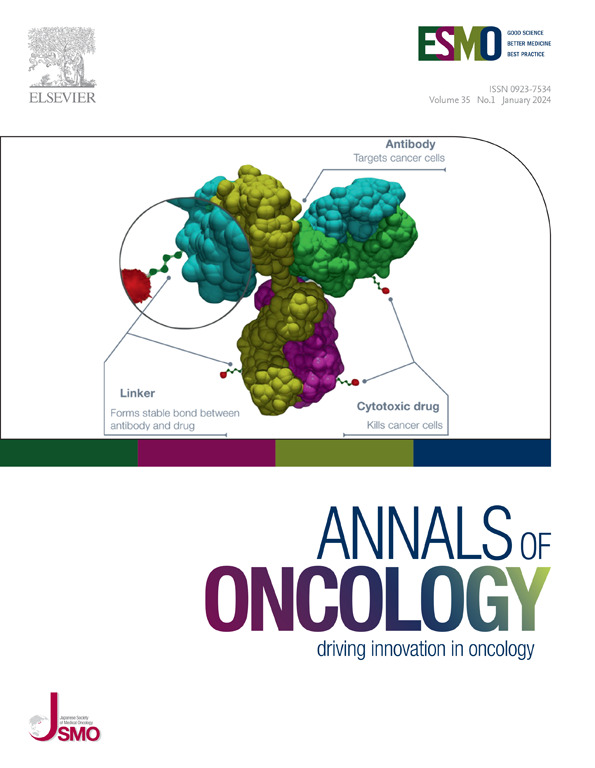术前化疗后复发风险高(ypN+和/或R1)的切除胃癌和食管胃交界癌患者的辅助免疫疗法:欧洲癌症研究和治疗组织(EORTC)1707 VESTIGE研究。
IF 56.7
1区 医学
Q1 ONCOLOGY
引用次数: 0
摘要
背景:新辅助化疗和切除术后肿瘤淋巴结阳性(ypN+)或手术切缘阳性(R1)的胃食管腺癌患者复发风险很高。nivolumab 对食管癌/食管胃交界处癌以及化疗和手术后的残留病理病变有效。免疫检查点抑制剂对晚期胃食管癌有疗效。我们假设,对于新辅助化疗和切除术后的高危(ypN+和/或R1)胃食管腺癌患者,nivolumab/ipilimumab比辅助化疗更有效:VESTIGE是一项国际学术性、多中心、开放标签、随机II期试验,评估nivolumab/ipilimumab辅助治疗与化疗对高复发风险胃食管腺癌的疗效。患者按1:1比例随机接受标准辅助化疗(与新辅助化疗方案相同)或nivolumab 3 mg/kg IV每2周加ipilimumab 1 mg/kg IV每6周,为期1年。主要纳入标准包括新辅助化疗加手术后的ypN+和/或R1状态。主要终点是意向治疗人群的无病生存期。次要终点包括总生存期、局部区域和远处失败率,以及根据NCI-CTCAE v5.0.调查结果确定的安全性:独立数据监测委员会于2022年6月审查了计划招募的240名患者中189名患者的数据,并建议因无效而停止招募。在最终分析时,195名患者(98名患者接受了nivolumab/ipilimumab治疗,97名患者接受了化疗)的中位随访时间为25.3个月。nivolumab/ipilimumab组的中位无病生存期为11.4个月(95%置信区间[CI],8.4-16.8个月),化疗组为20.8个月(95% CI,15.0-29.9个月),HR为1.55(95% CI,1.07-2.25,单侧P=0.99)。12个月无病生存率分别为47.1%和64.0%。没有毒性问题或过多的早期停药:与化疗相比,Nivolumab/ipilimumab不能改善ypN+和/或R1胃食管腺癌患者在新辅助化疗和手术后的无病生存率。本文章由计算机程序翻译,如有差异,请以英文原文为准。
Adjuvant immunotherapy in patients with resected gastric and oesophagogastric junction cancer following preoperative chemotherapy with high risk for recurrence (ypN+ and/or R1): European Organisation of Research and Treatment of Cancer (EORTC) 1707 VESTIGE study
Background
Patients with gastro-oesophageal adenocarcinoma with tumour-positive lymph nodes (ypN+) or positive surgical margins (R1) following neoadjuvant chemotherapy and resection are at high risk of recurrence. Adjuvant nivolumab is effective in oesophageal/oesophagogastric junction cancer and residual pathological disease following chemoradiation and surgery. Immune checkpoint inhibition has shown efficacy in advanced gastro-oesophageal cancer. We hypothesised that nivolumab/ipilimumab would be more effective than adjuvant chemotherapy in high-risk (ypN+ and/or R1) patients with gastro-oesophageal adenocarcinoma following neoadjuvant chemotherapy and resection.
Patients and methods
VESTIGE was an academic international, multicentre, open-label, randomised phase II trial evaluating the efficacy of adjuvant nivolumab/ipilimumab versus chemotherapy in gastro-oesophageal adenocarcinoma at high risk of recurrence. Patients were randomised 1 : 1 to receive standard adjuvant chemotherapy (same regimen as neoadjuvant) or nivolumab 3 mg/kg intravenously (i.v.) every 2 weeks plus ipilimumab 1 mg/kg i.v. every 6 weeks for 1 year. Key inclusion criteria included ypN+ and/or R1 status after neoadjuvant chemotherapy plus surgery. The primary endpoint was disease-free survival in the intent-to-treat population. Secondary endpoints included overall survival, locoregional and distant failure rates, and safety according to National Cancer Institute Common Terminology Criteria for Adverse Events v5.0.
Results
The independent Data Monitoring Committee reviewed data from 189 of the planned 240 patients in June 2022 and recommended stopping recruitment due to futility. At the time of final analysis, median follow-up was 25.3 months for 195 patients (98 nivolumab/ipilimumab and 97 chemotherapy). Median disease-free survival for the nivolumab/ipilimumab group was 11.4 months [95% confidence interval (CI) 8.4-16.8 months] versus 20.8 months (95% CI 15.0-29.9 months) for the chemotherapy group, hazard ratio 1.55 (95% CI 1.07-2.25, one-sided P = 0.99). The 12-month disease-free survival rates were 47.1% and 64.0%, respectively. There were no toxicity concerns or excess early discontinuations.
Conclusion
Nivolumab/ipilimumab did not improve disease-free survival compared with chemotherapy in patients with ypN+ and/or R1 gastro-oesophageal adenocarcinoma following neoadjuvant chemotherapy and surgery.
求助全文
通过发布文献求助,成功后即可免费获取论文全文。
去求助
来源期刊

Annals of Oncology
医学-肿瘤学
CiteScore
63.90
自引率
1.00%
发文量
3712
审稿时长
2-3 weeks
期刊介绍:
Annals of Oncology, the official journal of the European Society for Medical Oncology and the Japanese Society of Medical Oncology, offers rapid and efficient peer-reviewed publications on innovative cancer treatments and translational research in oncology and precision medicine.
The journal primarily focuses on areas such as systemic anticancer therapy, with a specific emphasis on molecular targeted agents and new immune therapies. We also welcome randomized trials, including negative results, as well as top-level guidelines. Additionally, we encourage submissions in emerging fields that are crucial to personalized medicine, such as molecular pathology, bioinformatics, modern statistics, and biotechnologies. Manuscripts related to radiotherapy, surgery, and pediatrics will be considered if they demonstrate a clear interaction with any of the aforementioned fields or if they present groundbreaking findings.
Our international editorial board comprises renowned experts who are leaders in their respective fields. Through Annals of Oncology, we strive to provide the most effective communication on the dynamic and ever-evolving global oncology landscape.
 求助内容:
求助内容: 应助结果提醒方式:
应助结果提醒方式:


